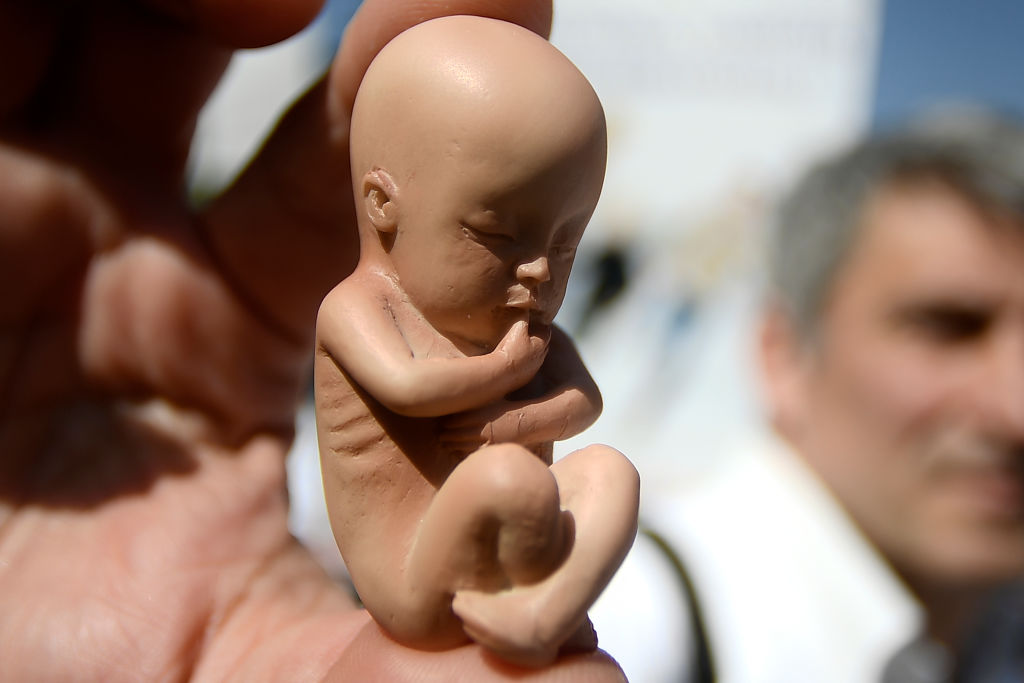This is a glaring inconsistency given that abortion, if the foetus is 22 weeks or older, involves an injection of potassium chloride. This solution is described as a ‘medicine’ by the British Pregnancy Advisory Service (BPAS) – the same ‘medicine’ used to execute death row inmates in the US and euthanise animals (although in these cases painkillers are always given first).
According to Human Rights Watch, potassium chloride “is excruciatingly painful if administered without proper anaesthesia. When injected into a vein, it inflames the potassium ions in the sensory nerve fibres, literally burning up the veins as it travels to the heart.”
Foetuses older than 15 weeks are removed from the womb through a procedure called ‘dilatation and evacuation’. The cervix is dilated for up to a day before the surgery and then forceps (metal grabbers) are pushed into the womb.
What the forceps do once they arrive in the womb is described by the NHS and BPAS as ‘removing’ the pregnancy. This is plainly euphemistic language; it is similar to saying that liposuction removes obesity, instead of fat; or that an appendicectomy removes appendicitis, instead of the appendix. This is another obfuscating euphemism to add to the collection: a foetus is ‘just a clump of cells’ (a description that could equally apply to an adult); a lethal solution of potassium chloride is ‘medicine’; and wrenching the foetus from the womb with forceps is simply ‘removing’ the pregnancy. But before 24 weeks of age, a “foetus cannot experience pain in any sense,” the Royal College of Obstetricians and Gynaecologists assures us. This is because connections in the cortex are not intact before 24 weeks, and “most neuroscientists believe that the cortex is necessary for pain perception.” A Department of Health spokesperson echoed this sentiment, telling The Spectator:Still the inconsistency remains. If foetuses cannot feel pain before 24 weeks, why are they given painkillers during surgical interventions for spina bifida? According to an article on the spine-mending procedure, published in the journal Anesthesiology by doctors from the University of California in 2014, foetuses experience ‘stress responses’ as early as 18 weeks. Because there is no cortical activity at this stage, these stress responses are mediated instead in the spinal cord, the brain stem or basal ganglia. The authors clarify that “these stress responses are different than the multidimensional, subjective phenomenon that we experience as pain” and add that painkillers during foetal operations are used in part to inhibit movement (by 19 weeks, foetuses can reflexively move away from ‘noxious stimuli’). They conclude: “…it is not known definitively when foetuses can experience pain. Therefore, it seems prudent to provide analgesia during foetal surgical procedures.” Professor John Wyatt, an ethicist at University College London and a retired consultant neonatologist, summed it up in three words: “the precautionary principle”. He said this principle should be followed when it comes to any intervention that could cause pain from 20 weeks:“Interpretation of existing data suggests that cortical processing and therefore foetal perception of pain cannot occur before 24 weeks of gestation. It is reasonable to infer from this that the foetus does not require analgesia for interventions occurring before 24 weeks of gestation.”
The precautionary principle in any other context would be completely uncontroversial. When it comes to abortion, however, it is a deeply unsettling acknowledgement that the foetuses we abort may be capable of suffering. For now, it seems we would rather be comfortable ourselves – shielded by euphemistic language and unwarranted certainties – than guarantee the weakest and most vulnerable among us the mercy of a painless death.“Confusingly, the Department of Health appears to be advising that one set of unborn babies at 20 weeks, those who are undergoing the new surgery, are provided with pain relief, but another set of unborn babies, those who are undergoing a termination of pregnancy, are not provided with pain relief. “The fact that death is imminent does not remove our ethical obligation to treat pain, even when we cannot be certain if it is present. Terminally ill patients are given the same pain relief when undergoing medical intervention as a patient that is not terminal.”






Comments